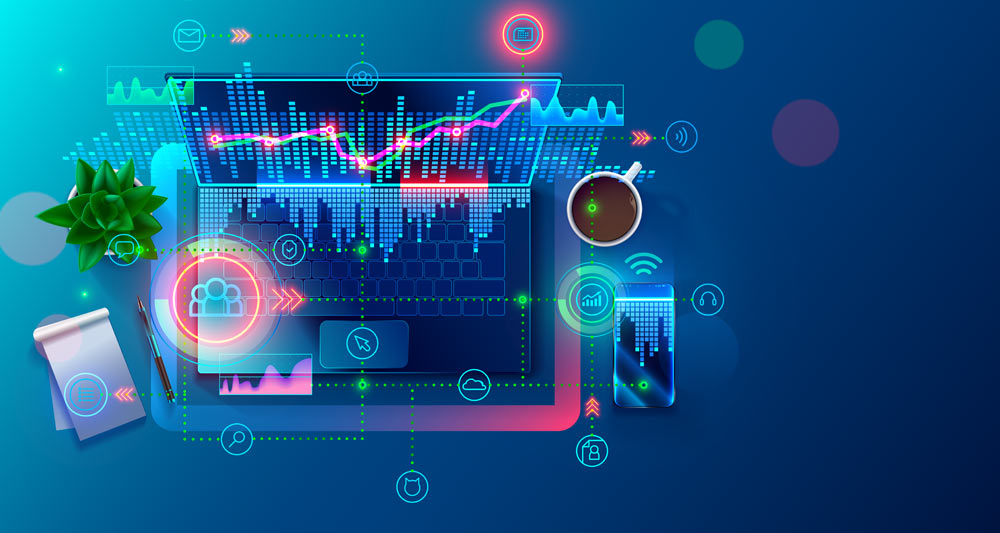Digital Disruption: Disaster or Opportunity for Accounting Professionals

July 30, 2021 | By Ryan Decker
Researcher: Vern Richardson
It’s no secret: technology is revolutionizing business practices and changing the way we live and work. Buzzwords like artificial intelligence (AI), data analytics, and machine learning are no longer just buzzwords. They are a reality. Companies that embrace these technologies across business processes can more-easily capitalize on future advancements, while those that lag behind risk losing market share, or worse, going extinct.
This trend is especially true of the accounting profession. Experts have called accounting “a profession that’s on its way out,” suggesting that technology will eliminate the need for accountants. Almost half of job categories are at risk of automation in the next two decades, and, while telemarketers take the top spot, accountants and auditors rank the second highest in terms of risk. As technology threatens to automate traditional accounting work and non-accounting graduates take over more accounting and finance functions, accountants must adapt to survive.
In “Act or Be Acted Upon: Revolutionizing Accounting Curriculums with Data Analytics,” Vern Richardson lays out a clear choice for the accounting profession: “either master technology or be mastered by technology. The choice is ours. Act or be acted upon.” Technology poses a threat to the accounting profession, and changes must be made at all levels. “At the same time that the accounting profession refocuses its traditional skillset,” Richardson says, “accounting educators need to refocus the accounting curriculum.”
Is There a Silver Lining?
While digital disruption poses a threat to some accounting jobs, some view this digital disruption as an opportunity. Automation of manual accounting tasks, such as data entry, accounts receivable/payable, and inventory counts, frees up skilled workers to provide more insight and analysis that benefits clients.
Luckily for accountants, they “clearly possess a unique skillset to improve an organization’s data analytics,” Richardson writes. Their knowledge of business processes and the flow of information allows them to ask the right questions and gather the right data. Accountants are also adept at interpreting the analysis and communicating the results to multiple audiences.
The future looks less bleak for accountants who can develop the skills they need to keep up with rapid technology innovation. Unfortunately, a substantial skills gap between what accountants do and what accounting educators teach exists, reflecting a cultural shift in the accounting profession. To remain competitive (and fend off the robots), accountants need to develop skillsets that aren’t easily automated.
Bridging the Skills Gap
As hard as we try, computers still outperform even the best human in several areas. For example, “Computer systems are arguably more efficient and effective at identifying, recording, classifying, and summarizing,” Richardson writes. Accountants, however, still have an edge when it comes to measuring, verifying, interpreting, and communicating. Because of this, the real power comes when accountants use technology to complement their traditional skillsets.
Verifying the accuracy of accounting information is an essential aspect of accounting and auditing. While these processes have historically been labor intensive, new technology allows professionals to spend less time on the routine work and focus on exceptions that may impact the accuracy of the data.
Richardson discusses how Robotic Process Automation (RPA) and blockchain technologies enhance the audit process. RPA allows an accountant to automate a repetitive task, such as regularly extracting and analyzing data from a company’s accounting system and reporting on irregularities, freeing up time for the auditor to focus on other areas of the audit. While RPA can even be used to verify travel expense reports or track hours and payroll for hourly employees, accountants are still needed to address exceptions in the data. Breathe a sigh of relief, accountants; robots aren’t completely taking over – yet.
Similarly, blockchain technologies have disrupted the process of verification. Blockchain verification differs from auditor verification, however, and accountants must still verify the data stored in the blockchain. Accountants and auditors must develop the skills necessary to understand and use RPA and blockchains to complement their existing accounting expertise.
Developing an Analytics Mindset
Data analytics is no longer just for the analysts: “to remain relevant,” Richardson writes, “accounting professionals need to develop an analytics mindset.” The analytics mindset includes asking the right questions, extracting, transforming, and loading relevant data, applying appropriate data analytics techniques, and interpreting and sharing the results with stakeholders.
“Accountants can serve a critical role as interpreter between management and data scientists/analysts/administrators,” Richardson states. Accounting professionals with data analytics knowledge can guide the analysis to answer important business questions by asking the right questions, identifying and analyzing relevant data, and giving the results context for managers. Accountants still play an important role in determining what needs to be communicated and how it needs to be communicated. If accountants choose not to fill this role, companies will instead hire data scientists and teach them accounting.
Major certification exams, including the Certified Public Accountant (CPA) and Certified Management Accountant (CMA) exams, began incorporating data analytics concepts in some of the exam sections in 2019 and 2020, respectively. While the CPA exam currently includes a few data analytics questions as part of the Business Environment and Concepts (BEC) and Audit and Attestation (AUD) sections, the Financial Accounting and Reporting (FAR) and Regulation (REG) sections do not mention data analytics. In an effort to recognize the rapidly changing competencies that are required of CPAs, the AICPA will completely redesign the CPA exam in 2024, placing a higher emphasis on critical thinking and problem-solving, data management, and analysis skills.
The two-part CMA exam changed dramatically in 2020 to reflect the importance of technology and analytics, designating 15% of part one to business intelligence, data mining, and data analytics and visualization topics. “The complete transformation of the CPA and CMA exams clearly indicates that the desired skillset for accountants has changed with data analytics becoming increasingly important,” Richardson writes.
The Role of Higher Education in Shaping the Future
Through my collaboration with employers to hold technology and analytics workshops for Walton College students, I have seen employers express a strong desire for analytics skills in full-time hires. “Despite the job market’s demand for students with an analytics mindset, the accounting curriculum has not changed to prepare students,” Richardson states. Traditional accounting and audit classes at many universities haven’t changed for many years, which means they’ve not kept pace with the industry’s rapid pace of change.
Some universities have made great strides in focusing on accounting analytics but, generally, the accounting curriculum has a long way to go to not only catch up but keep up with the rapidly changing industry. Textbooks and courses haven’t changed much outside of recently added data analytics courses, the CPA exam hasn’t changed much, and instructors don’t consistently use data or analytics tools to answer questions.
To illustrate this, Richardson considers a typical CPA multiple choice exam question for calculating allowance for doubtful accounts using the Sales Method. All it takes to answer the question is to memorize a formula: Allowance for Doubtful Accounts = Estimated Bad Debt % * Sales Revenue. “Is that what we should test in our classes and on the CPA exam?” Richardson asks, “Something that can just be memorized (and readily done by computers) and doesn’t take any further analysis?” He argues that accounting departments can start by refocusing the accounting curriculum to instill critical thinking skills instead.
Making an IMPACT
To develop critical thinking skills and show students how to link accounting and data analytics, Richardson recommends the IMPACT model. IMPACT stands for: Identify the Question, Master the Data, Perform Analysis, Address and Refine Results, Communicate, and Track Outcomes. Richardson found the IMPACT model effective in several classes at different universities, especially for those without strong technical skills. Because of this, Richardson writes that “instructors may wish to tailor the extent of use of the IMPACT model based on their students’ technical skills level.” Regardless of technical skill, however, students appreciated having data analytics taught through the lens of accounting.
Richardson sees value in making the accounting curriculum as realistic as possible. To do this, he recommends providing students with messy datasets that must be cleaned or verified before use. Data scientists spend approximately 80% of their time on managing or preparing the data. “To make the classroom experience real,” Richardson says, “sometimes accounting educators must give students experience with the messiest dataset possible.” In addition, giving students agency to come up with their own data analysis projects help students learn on their own and develop critical thinking skills.
Act or Be Acted Upon
The accounting profession dates back to the 19th century, with the actual practice of accounting and bookkeeping preceding the profession by centuries. The profession of today obviously differs from what it was in the 1800s, and more changes are to come. If accountants and university accounting curriculum cannot keep up with the rapid pace of change, the future of the profession is in jeopardy.
The future of the profession is in the hands of accounting educators, Richardson suggests. “Hence, accounting educators must revolutionize the accounting curriculum to produce accounting graduates with an analytics mindset.” By focusing on data analytics skills among accounting students, graduates will be poised to analyze the data and provide context to managers and stakeholders wanting to make informed decisions.
If students do not enter the workforce equipped with these skills, data scientists and technicians may absorb the profession. “Thus, the accounting profession faces a choice: either master technology or be mastered by technology. The choice is ours. Act or be acted upon.”


